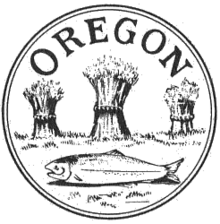
John McLoughlin, baptized Jean-Baptiste McLoughlin, was a French-Canadian, later American, Chief Factor and Superintendent of the Columbia District of the Hudson's Bay Company at Fort Vancouver from 1824 to 1845. He was later known as the "Father of Oregon" for his role in assisting the American cause in the Oregon Country. In the late 1840s, his general store in Oregon City was famous as the last stop on the Oregon Trail.

Oregon City is the county seat of Clackamas County, Oregon, United States, located on the Willamette River near the southern limits of the Portland metropolitan area. As of the 2020 census, the city population was 37,572. Established in 1829 by the Hudson's Bay Company, in 1844 it became the first U.S. city west of the Rocky Mountains to be incorporated.

Oregon Country was a large region of the Pacific Northwest of North America that was subject to a long dispute between the United Kingdom and the United States in the early 19th century. The area, which had been created by the Treaty of 1818, consisted of the land north of 42°N latitude, south of 54°40′N latitude, and west of the Rocky Mountains down to the Pacific Ocean and east to the Continental Divide. Article III of the 1818 treaty gave joint control to both nations for ten years, allowed land to be claimed, and guaranteed free navigation to all mercantile trade. However, both countries disputed the terms of the international treaty. Oregon Country was the American name while the British used Columbia District for the region.

George Abernethy was an American politician, pioneer, notable entrepreneur, and first governor of Oregon under the provisional government based in the Willamette Valley, an area later a part of the American state of Oregon. He traveled to Oregon Country as a secular member of the Methodist mission, where he became involved in politics and helped found the first American newspaper west of the Rocky Mountains.
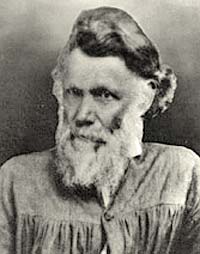
Joseph Goff Gale was an American pioneer, trapper, entrepreneur, and politician who contributed to the early settlement of the Oregon Country. There he assisted in the construction of the first sailing vessel built in what would become the state of Oregon, sailed the ship to California to trade for cattle, and later served as one of three co-executives ("governors") in the Provisional Government of Oregon. Originally a sailor, he also spent time in the fur trade, as a farmer, and a gold miner in the California Gold Rush.

Asa Lawrence Lovejoy was an American pioneer and politician in the region that would become the U.S. state of Oregon. He is best remembered as a founder of the city of Portland, Oregon. He was an attorney in Boston, Massachusetts before traveling by land to Oregon; he was a legislator in the Provisional Government of Oregon, mayor of Oregon City, and a general during the Cayuse War that followed the Whitman massacre in 1847. He was also a candidate for Provisional Governor in 1847, before the Oregon Territory was founded, but lost that election.
David Hill was an American pioneer and settler of what became Hillsboro, Oregon, United States. He served in the Provisional Government of Oregon in both the executive and legislative branches, and later as a legislator in the first Oregon Territorial Legislature. Hill made a transaction with the county court in 1850 that led to the renaming of Columbus to Hillsborough in honor of Hill.

The Champoeg Meetings were the first attempts at formal governance by European-American and French Canadian pioneers in the Oregon Country on the Pacific Northwest coast of North America. Between 1841 and 1843, a series of public councils was held at Champoeg, a settlement on the French Prairie of the Willamette River valley in present-day Marion County, Oregon, and at surrounding settlements. The meetings were organized by newly arrived settlers as well as Protestant missionaries from the Methodist Mission and Catholic Jesuit priests from Canada.

Oregon pioneer history (1806–1890) is the period in the history of Oregon Country and Oregon Territory, in the present day state of Oregon and Northwestern United States.
Alanson Beers was an American pioneer and politician in the early days of the settlement of the Oregon Country. A blacksmith by trade, he was a reinforcement for the Methodist Mission in what would become the state of Oregon. The Connecticut native helped found the Oregon Institute and participated in the Champoeg Meetings where he was elected to serve on the Executive Committee in 1843.
William J. Bailey was a British-born physician who migrated to the United States, where he became a pioneer and politician in the Oregon Country, particularly the Willamette Valley. Bailey participated in the Champoeg Meetings that led to the creation of a provisional government in Oregon. He was selected as a member of that government, first on the executive committee and later in the Provisional Legislature of Oregon.
The Oregon Rangers was the first organized militia of the white settlers located in the Willamette Valley in the contested region of the Oregon Country, later the U.S. state of Oregon. First established in 1844, the force was never called out to service by the Provisional Government of Oregon and was soon dissolved. Later a second militia was formed in 1846 with the same name, which lasted only a few months. An early historian of Oregon, Frances Fuller Victor, gave a negative assessment of the two forces, stating there lacked "any deeds of prowess performed by the rangers..."
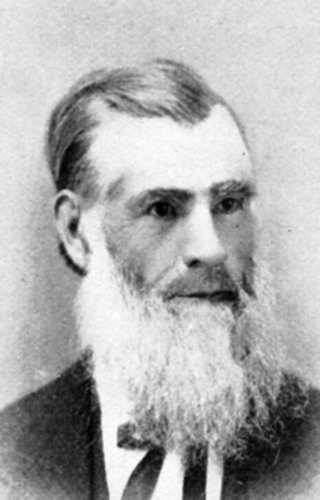
William Henry Gray (1810–1889) was a pioneer politician and historian of the Oregon Country in the present-day U.S. state of Oregon. He was an active participant in creating the Provisional Government of Oregon. Gray later wrote the book A History of Oregon, 1792-1849 and was instrumental in the establishment of the Oregon Pioneer Society.
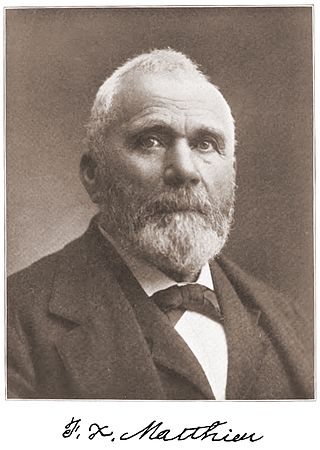
François "Francis" Xavier Matthieu was a French Canadian pioneer settler of the Oregon Country. He was educated in American values by a radical schoolteacher. Matthieu became involved in the 1837–1838 armed rebellion against British rule in Canada, for which he was forced to flee his native Quebec for safety in the United States, where he worked as a carpenter and a fur trader.

Peter Grant Stewart was a jeweler and pioneer of the Oregon Country in what later became the U.S. states of Oregon and Washington. A native of New York state, he traveled the Oregon Trail to the Willamette Valley and settled first in Oregon City and later in what became Washington. He was served on the Second Executive Committee of the Provisional Government of Oregon, and his homesite became part of Fort Canby at the mouth of the Columbia River.

The Provisional Government of Oregon was a popularly elected settler government created in the Oregon Country, in the Pacific Northwest region of North America. Its formation had been advanced at the Champoeg Meetings since February 17, 1841, and it existed from May 2, 1843 until March 3, 1849, and provided a legal system and a common defense amongst the mostly American pioneers settling an area then inhabited by the many Indigenous Nations. Much of the region's geography and many of the Natives were not known by people of European descent until several exploratory tours were authorized at the turn of the 18th and 19th centuries. The Organic Laws of Oregon were adopted in 1843 with its preamble stating that settlers only agreed to the laws "until such time as the United States of America extend their jurisdiction over us". According to a message from the government in 1844, the rising settler population was beginning to flourish among the "savages", who were "the chief obstruction to the entrance of civilization" in a land of "ignorance and idolatry".
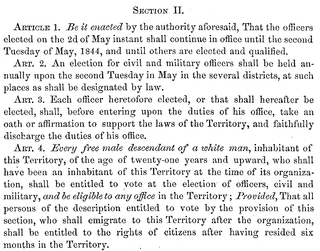
The Organic Laws of Oregon were two sets of legislation passed in the 1840s by a group of primarily American settlers based in the Willamette Valley. These laws were drafted after the Champoeg Meetings and created the structure of a government in the Oregon Country. At the last Champoeg Meeting in May 1843, the majority voted to create what became the Provisional Government of Oregon. Laws were drafted by the committee and accepted by a popular vote in July. These laws were reformed by a second version in 1845.

Reverend Josiah Lamberson Parrish was an American missionary in the Pacific Northwest and trustee of the Oregon Institute at its founding. A native of New York, he also participated in the Champoeg Meetings that led to the formation of the Provisional Government of Oregon in 1843. Parrish was married three times and was the first breeder of pure-bred sheep in Oregon.

Alvin Thompson Smith was an American missionary and politician in what became the state of Oregon. A native of Connecticut, he lived in Illinois before moving to the Oregon Country to preach to the Native Americans in the Tualatin Valley. There he served in both the Provisional Government of Oregon and the government of the Oregon Territory, as well as helping to establish Tualatin Academy, later becoming Pacific University. Smith’s former home, the Alvin T. Smith House in Forest Grove, is listed on the National Register of Historic Places.

Thomas Dove Keizur was one of the earliest American pioneers to settle in the Oregon Country. In 1843, he led his large family from Missouri to Oregon over the Oregon Trail. He homesteaded in Oregon's Willamette Valley in an area north of modern-day Salem, Oregon. Keizur was one of eight citizens elected to serve on Oregon's third pre-provisional legislative committee which helped lay the foundation for the establishment of the Oregon Territory. He was also the first captain of the Oregon Rangers, the first militia unit organized in Oregon. Today, the city of Keizer, Oregon, is named in his honor.
